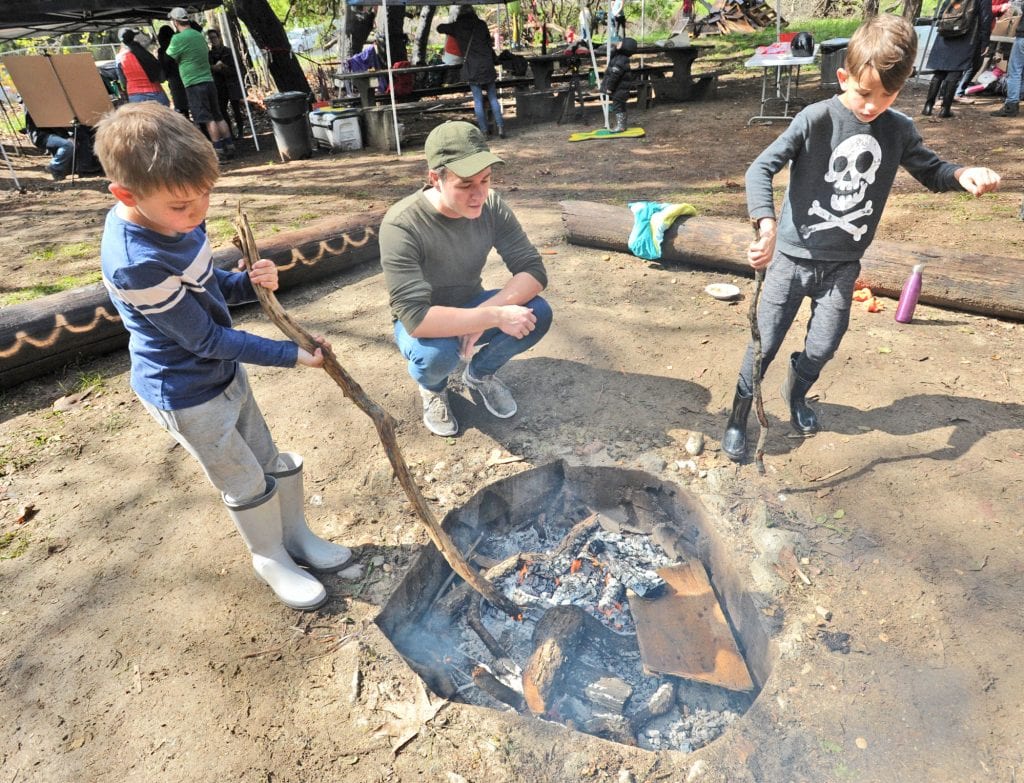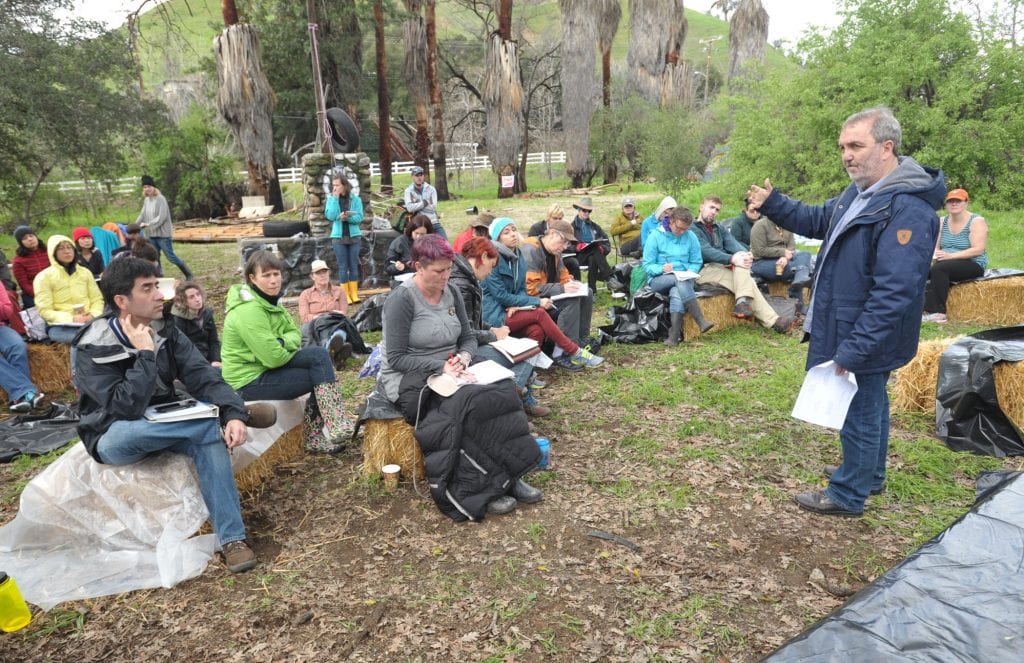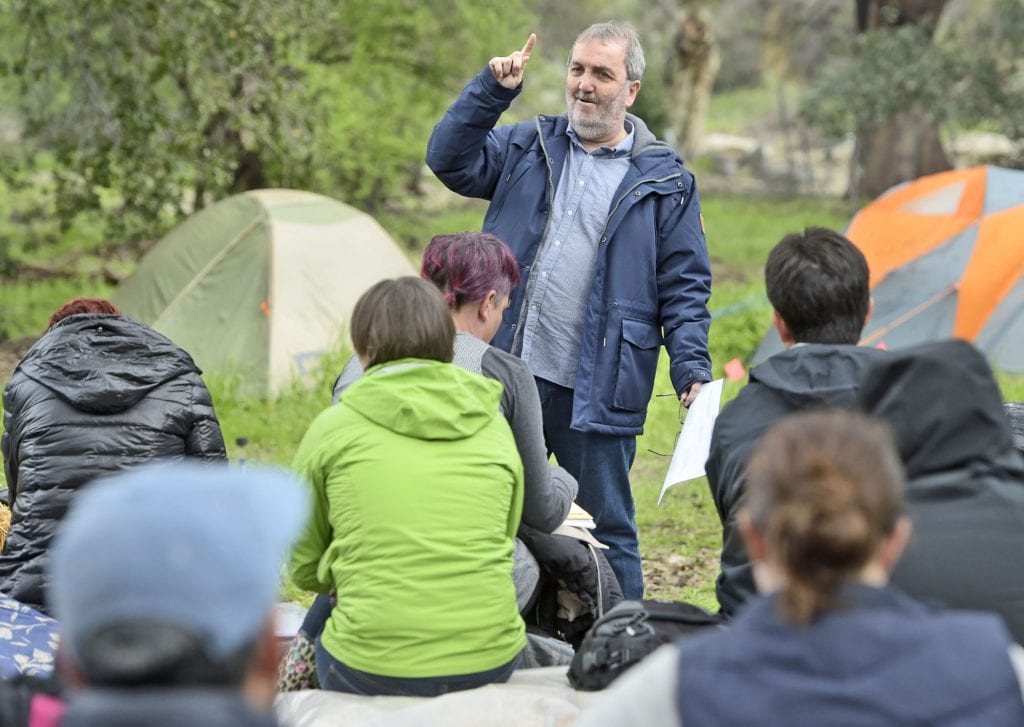Upon entering the adventure playground in Val Verde, one is introduced to a rather unusual scene for this day and age. Children are building forts with hammers, playing with fire, climbing trees and other activities parents might feel apprehensive with. The adults…they observe.
No one tells the children to stop playing with fire or to put down the hammer. If a child engages in risky behavior and leaves the fire pit with a smoking branch, they are guided back to it.
At an adventure playground, no adult puts their own agenda on what the children want to do with their time.
This special playground is a result of the playwork movement. In fact, 91 people associated with the movement came from seven different countries and camped out in Val Verde for the “Playwork Campference” from Thursday to Sunday to learn about this specific approach to child’s play.
“It’s distinguished by a value of play for its own sake so separate from educational outcomes or health goals or any other adult set agenda,” said Morgan Leichter-Saxby, a co-founder of the conference.

Even as the rain started to pour down, the 91 people stayed dedicated to finishing their conference.
A local church and school were kind enough to open up their doors to the conference so they could continue their program while staying dry.
In fact, Dockray lives in the Val Verde community and banded his neighbors together to shelter many of them at night. Around 10 houses in the area and surrounding cities opened up their doors to the campers.
During the storm, everyone had a safe place to sleep whether that be a hotel or house.
“We made a few calls [and] people opened up their homes to them,” said Dockray.
It only made sense that the community opened up their doors to the campers as community is a big value of the movement. Another value is playing for the sake of play.

Playing for the sake of play is the first priority and Leichter-Saxby is so dedicated to the cause that she is pursuing a PhD in playwork at Leeds Beckett University in the United Kingdom.
She, and other associated with the movement, call themselves playworkers.
The conference entailed sessions where parents and others in the movement could learn how to safely support children to play in innovative ways. There were sessions on using nails and hammers, starting fires, using swings and hammocks and several other activities that promote curiosity and creativity.
“It’s not about what makes us feel comfortable but what children need,” said Leichter-Saxby.
Many in the movement have a nostalgia for the way children used to play decades ago. They were free to meet friends and romp around the neighborhood without adult supervision.

These adventure playgrounds and more temporary pop-up adventure playgrounds provide a compensatory place for children to play in a free fashion akin to many decades ago. The “scripted” playgrounds people see today don’t suit a child’s needs of exploring their curiosity, as Dockray points out.
“At a normal, kind of cut and paste playground you do the same kind of gross motor play, running, jumping and climbing” said Dockray.
In an adventure playground, if a child wants to use a hammer and nails safely and can be trusted to, than that child will be given hammer and nails.
One such example of this was when seven-year-old Dallas Dockray was working on building a fort.
“Can I have a hammer and some nails?” he asked his dad.
Without asking what he plans to do with them, Dockray tells him where to find them. Dockray said that if Dallas was alone, he would trust him to use a hammer and nails by himself.
Now, a seven-year-old using a hammer might seem unusual but that is what the playwork movement is all about: giving children freedom to explore their curiosity and not be guided by adults.

Nonetheless, risk-assessment is a big value of the movement. If a child wants to climb a tree that has a pile of bricks underneath, then they might be guided to a safer tree by statements like, “You can get higher on that tree.”
“We want to use the lightest touch possible,” said Leichter-Saxby.
The Playwork Campference was organized by Pop-Up Adventure Play, and a local organization called Santa Clarita Valley Adventure Play that Dockray and his wife founded.
Dockray hopes in the next year he can open up the adventure playground in Val Verde to the community. Until that time, anyone interested in the movement can visit their website at https://scvadventureplay.com/.








